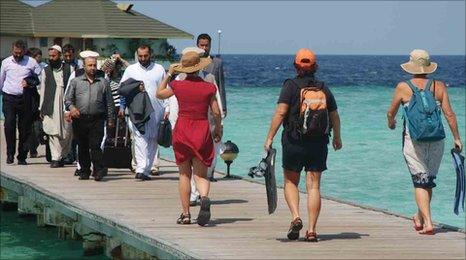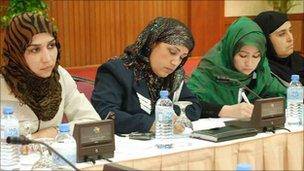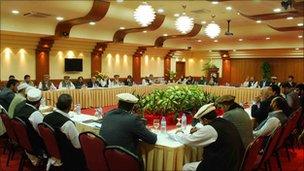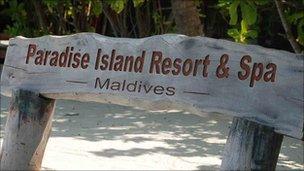Afghan peace talks in a holidaymakers' paradise
- Published

Some of the delegates were a little uncomfortable mingling with Western tourists
Representatives of various Afghan factions recently held informal discussions in the Maldives. The island paradise is a world away from the bloodshed of Afghanistan and seems an unlikely choice for such talks - but delegates said they made progress. BBC Persian TV's Daud Qarizadah joined the factions as they rubbed shoulders with the jet-set and dodged women in bikinis.
This was the third round of informal Afghan talks to be held this year in the Maldives, attended by 47 members of different groups and representatives of leading political figures. Those present included Afghan civil society activists and members of parliament, four of them women. The Afghan government did not send anyone, but there were delegates representing the country's two vice-presidents.
What was seen as a breakthrough this time was the presence of members of the main insurgent groups that have been involved in fighting foreign and Afghan forces for the past nine years. The Afghan Taliban, the Haqqani group and the Hezb-e-Islami of Gulbuddin Hekmatyar were all represented in one way or another.
Firoz Hekmatyar was representing his father, Gulbuddin Hekmatyar, a renegade Afghan leader who is on the US most-wanted list.
Peace and reconciliation
The talks were organised by Homayoun Jarir, an Afghan politician and close relative of Mr Hekmatyar. Mr Jarir has been involved in peacemaking efforts for several years and says the Maldives talks are part of his efforts to find a political settlement for his war-torn country.

Some objected to the attendance of four women at the talks
Mr Jarir says the cost of the talks - more than $100,000 (£62,000) - was paid by Afghan businessmen.
The Afghan government has been playing down the significance of the Maldives talks. President Hamid Karzai's spokesman, Waheed Omar, expressed doubt, saying "holding talks in luxury resorts wouldn't produce any result".
There are similar efforts inside Afghanistan initiated by President Karzai. A "High Peace Council" was set up to promote peace and reconciliation. The council is headed by the former Afghan President Burhanuddin Rabbani.
However, it will be difficult for the High Peace Council to hold the Maldives-style peace talks inside Afghanistan as some of the participants would seek security guarantees and would not be able to travel to Afghanistan.
Which is why the Maldives is a convenient location for these efforts. It is one of the few countries in the world that issues free visas on arrival at the airport to everyone, including Afghans.
Some of the participants of the talks belong to organisations that are proscribed by the United States and face travel restrictions.
Most of the delegates travelled from Kabul to Dubai and then on to the Maldives capital, Male. Some travelled from Pakistan.
Different visitors
"The neutrality of the Maldives government in Afghan issues is another reason for choosing this small Islamic and island nation in the Indian Ocean for holding the peace talks," says Mr Jarir.

A ceasefire was proposed to build confidence in Afghanistan
The aptly-named Paradise Island hosted the talks. The tiny resort island - 1km (0.6 miles) long and 230m (250 yards) wide - is one of nearly 1,200 that make up the Maldives. It attracts thousands of tourists every year.
The incredible natural beauty of the Maldives, its blue waters and warm welcome are not only a main attraction for honeymooners, sun-worshippers and divers - they also seemed to go down pretty well with the rather different visitors from Afghanistan.
Afghanistan is land-locked and for many of those present, this was the first time they had seen the sea. Some had never even left Afghanistan before.
One first-time delegate in the Maldives said: "It is a beautiful Islamic country and the scenery is amazing." Another delegate who was also there for the first time added that he "wished Afghanistan would become as peaceful as the Maldives one day".
As soon as the delegates arrived at their hotel in Paradise Island, the contrast was striking. They had to hold talks just metres away from where women in bikinis were sunbathing or had just been swimming.
Whenever the delegates encountered women in bikinis, they turned their eyes away in order to avoid becoming sinful by looking at half-naked women. This was a difficult situation for some to cope with - especially for those delegates who want women to wear the all-covering burka.
One of the delegates was even angry at the four Afghan women who attended the talks. He told me that these women should not have come to the talks unless they were accompanied by their husbands or close male family members.
'Peace agreement'
Despite all the distractions, talks were held and resulted in a "peace proposal" which was approved after heated debate on how to end the decades-long war in Afghanistan. Delegates' views differed widely.

For many the visit to the Maldives was their first trip outside Afghanistan
Some said the bad behaviour of foreign forces in the country was the main obstacle to peace - while others blamed President Karzai's government for the continuing insecurity.
The peace proposal called for a ceasefire to build confidence in Afghanistan. It also called for foreign forces to withdraw from Afghanistan and for all the warring sides to share power.
Delegates proposed that a National Security Council be set up as the most powerful body in the country. All warring parties would be members, allowing them to take responsibility for the affairs of the country.
Participants in the talks were optimistic that the proposal, if supported by all the warring sides, could be a good step towards ending the war which has devastated their country.
The proposal is now going to be discussed with Afghanistan's influential neighbours like Pakistan and Iran, other regional countries and the United Nations.